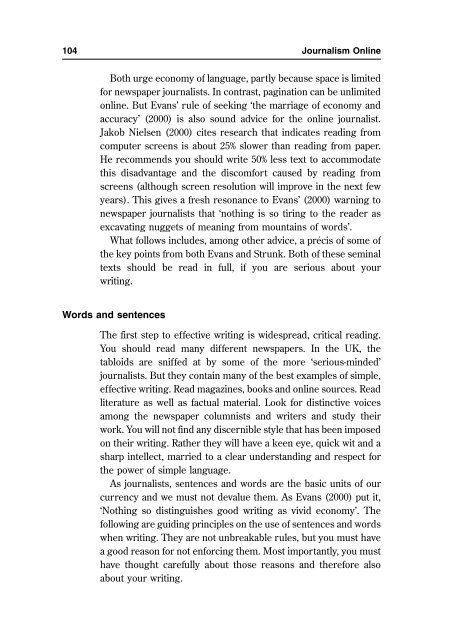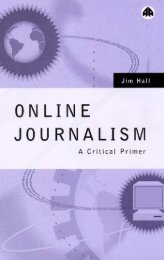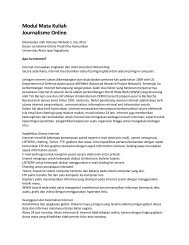1What is online journalism? - Ayo Menulis FISIP UAJY
1What is online journalism? - Ayo Menulis FISIP UAJY
1What is online journalism? - Ayo Menulis FISIP UAJY
You also want an ePaper? Increase the reach of your titles
YUMPU automatically turns print PDFs into web optimized ePapers that Google loves.
104 Journal<strong>is</strong>m Online<br />
Both urge economy of language, partly because space <strong>is</strong> limited<br />
for newspaper journal<strong>is</strong>ts. In contrast, pagination can be unlimited<br />
<strong>online</strong>. But Evans’ rule of seeking ‘the marriage of economy and<br />
accuracy’ (2000) <strong>is</strong> also sound advice for the <strong>online</strong> journal<strong>is</strong>t.<br />
Jakob Nielsen (2000) cites research that indicates reading from<br />
computer screens <strong>is</strong> about 25% slower than reading from paper.<br />
He recommends you should write 50% less text to accommodate<br />
th<strong>is</strong> d<strong>is</strong>advantage and the d<strong>is</strong>comfort caused by reading from<br />
screens (although screen resolution will improve in the next few<br />
years). Th<strong>is</strong> gives a fresh resonance to Evans’ (2000) warning to<br />
newspaper journal<strong>is</strong>ts that ‘nothing <strong>is</strong> so tiring to the reader as<br />
excavating nuggets of meaning from mountains of words’.<br />
What follows includes, among other advice, a préc<strong>is</strong> of some of<br />
the key points from both Evans and Strunk. Both of these seminal<br />
texts should be read in full, if you are serious about your<br />
writing.<br />
Words and sentences<br />
The first step to effective writing <strong>is</strong> widespread, critical reading.<br />
You should read many different newspapers. In the UK, the<br />
tabloids are sniffed at by some of the more ‘serious-minded’<br />
journal<strong>is</strong>ts. But they contain many of the best examples of simple,<br />
effective writing. Read magazines, books and <strong>online</strong> sources. Read<br />
literature as well as factual material. Look for d<strong>is</strong>tinctive voices<br />
among the newspaper column<strong>is</strong>ts and writers and study their<br />
work. You will not find any d<strong>is</strong>cernible style that has been imposed<br />
on their writing. Rather they will have a keen eye, quick wit and a<br />
sharp intellect, married to a clear understanding and respect for<br />
the power of simple language.<br />
As journal<strong>is</strong>ts, sentences and words are the basic units of our<br />
currency and we must not devalue them. As Evans (2000) put it,<br />
‘Nothing so d<strong>is</strong>tingu<strong>is</strong>hes good writing as vivid economy’. The<br />
following are guiding principles on the use of sentences and words<br />
when writing. They are not unbreakable rules, but you must have<br />
a good reason for not enforcing them. Most importantly, you must<br />
have thought carefully about those reasons and therefore also<br />
about your writing.
















